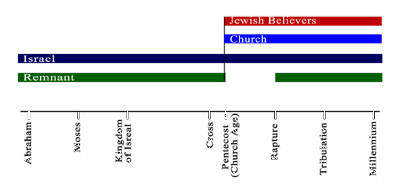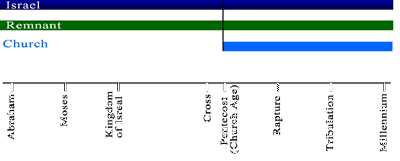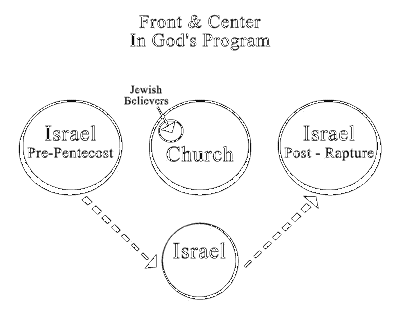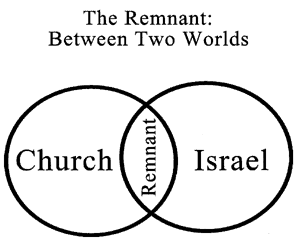

Theological Reconsiderations Concerning The Remnant
The Remnant within Classic Dispensational Theology
Dispensationalism, as with all theological systems, attempts to
categorize and systematize the revelation of God. Each particular
theological system’s weakness is revealed by what happens to that
specific data which does not neatly fit into the proposed constructs, grids
and containers of that theology. Theologians generally hate tensions,
antinomies and, above all, squishy facts that do not seem to neatly fit into
one categorical box or another. The remnant of Israel is a prime example
of this unfortunate pattern. This section, perhaps the most controversial,
must begin with a disclaimer. What I am proposing is a revisitation of a
particular poorly developed area within Dispensationalism, not
Dispensationalism as a system. These views should in no way be
interpreted as advocating Progressive Dispensationalism.
Much of what is being discussed can be also found within Arnold
Fruchtenbaum’s massive and comprehensive Israelology: The Missing
Link in Systematic Theology. It was reassuring to discover that
Fruchtenbaum had arrived at many of the following conclusions ahead of
this author, often choosing the same texts from which to study.
Israel’s glorious past and future figure most prominently throughout the
traditional dispensational system, yet it seems that only the theological
equivalent of "lipservice" is given to the realities of Israel in this present
dispensation.
Two classic, decades-long DTS textbooks will suffice for examination:
Dr. Chafer’s Systematic Theology8 and Dr. Pentecost’s Things to
Come.9 These particular works were chosen, not on the basis of being
the most contemporary presentations of dispensational systematics, but
on the basis of sustained influence as well as continued, widespread
usage both within and without the classroom setting. In Pentecost’s
classic volume Things To Come, we particularly see how the
contemporary manifestation of the remnant is conspicuously absent
within foundational Dispensationalism.
After the day of Pentecost and until the rapture we find the
church…but no spiritual Israel. After the rapture we find no
church, but a true or spiritual Israel again.
Pentecost is denying the very existence of a present remnant, proposing
no true Israel in this dispensation whatsoever, contra Paul (Rom. 11),
contra Peter (1 Peter 2:1-10). It would seem from their writings that these
apostles certainly understood themselves to be the remnant.
From the time of Christ’s rejection by Israel until the time
when God deals specifically with Israel again in the
seventieth week it is not possible to refer to a remnant of the
nation Israel. In the body of Christ all national distinctions
disappear. All Jews who are saved are not saved into a
national relationship, but into a relationship to Christ in that
body of believers…There is no continuing remnant of Israel
with whom God is particularly dealing today…Because that
nation is now blinded, God can not have a remnant within the
nation.
Jewish believers neither lose ethnicity nor nationality. The whole point of
what Paul argues in Romans 11 is to demonstrate that a contemporary
remnant currently is manifesting itself, as usual. Without a remnant, there
is no Israel of God (Gal 6:16) and the promises of God have been voided,
leaving God unfaithful indeed (see figure 5).

It goes beyond the Biblical text to explain away Jewish believers’ current
enjoyment of the spiritual blessings of the New Covenant by denying that
they are members of the remnant of Israel. "By definition, this group
(Jewish believers) bears a dual identity as both a remnant within Israel
the people and as a particular community within the body of Christ"12
(see figure 6).

When God again deals with the nation Israel, salvation will be offered on
the basis of the blood of Christ.
When has God ceased dealing with Israel? And is not salvation now
presently offered to them on the basis of Christ’s blood? One would get
the impression from reading Things to Come that within the current
church age, there are currently no Jews getting saved.
As long as the church is on the earth there are none saved
to a special Jewish relationship. All who are saved are saved
to a position in the body of Christ.
Pentecost creates a false dichotomy. He is confusing believing Gentiles
with the Church. In the passion to keep Israel and the Church distinct,
Pentecost has obliterated God’s remnant in this age (see figure 7).

God will first conclude his work for the Gentiles in the period
of Israel’s dispersion; then he will return to bring in the
promised blessings for Israel.
The church is manifestly an interruption of God’s program for
Israel…this mystery program must itself be brought to a
conclusion before God can resume His dealing with the
nation Israel.
Jewish believers are like the tiny Whos in Whoville in Dr. Seuss’s Horton
Hears a Who, shouting at the top of their lungs, "We are here, we are
here, we are here!" (see figure 8). The tendency among some
Dispensationalists, who know better, seems to be to use "believing
Gentiles" and "the church" interchangeably, substituting one term for the
other at will.

Israel and the Church
Even if one yields to the preponderance of evidence of God working with
Israel through the remnant, the question then arises as to whether God is
still working with Israel outside of the remnant. Pentecost’s system
rejects both alternatives, overlooking that God is working with Jews
during this present dispensation, both within the church and even outside
of it as a national entity (see figure 9). "Yahweh continues to be revealed
in Israel, both within and apart from the body of believers…God is still
revealed through the existence of the people of Israel, just as in times
past."

To teach that within the present dispensation God is only dealing with the
church is declaring that God only works with one group of His people at a
time. Biblically, why should we limit God to working with one group at a
time? Does God only conduct with one hand? Is His arm too short? Is He
not ambidextrous?
Even a poor conductor can conduct different sections of his orchestra
using two hands simultaneously. If the woodwind section is currently
playing more loudly than is the string section, the conductor is still equally
conducting both sections. And if the score calls for the string section to
cease playing in the middle of a presentation so that another group may
take up the musical motif, the strings’ present silence is in no way an
indication that they are no longer under the conductor’s sway. And, of
course, it is also no indication that they have ceased playing altogether.
Unbelieving Israel is neither set aside nor on the back burner in this
dispensation. God has been steadily working his way, orchestrating lives,
generations and historical events to the crescendo level that is presently
beginning to break out. Soon enough, imminently, Scripture indicates, all
members of the orchestra will be performing at full tilt.
An alternate way to illustrate these truths would be to picture a freshwater
river flowing from west to east (see figure 10). This fresh water river is
ethnic Israel. Somewhere along its course, the river splits. The majority,
unbelieving Israel, changes course, flowing southward (Rom 11:7-10).
What’s left, a mere remnant of Israel, now no more than a mere brook,
remains on course (Rom. 11:5). The brook is suddenly intersected by a
mightysaltwater river. These are believing Gentiles (Rom 11:17).
Together, the freshwater brook, the believing Jews, and the saltwater
river, believing Gentiles, flow together, mysteriously retaining both their
fresh and salty distinctiveness (Eph. 3:6). Saltwater and freshwater fish
alike are able to thrive in these waters together. This is the church, and it
will flow inexorably toward its final destination.

Meanwhile, the mighty freshwater river of unbelieving Israel which had so
drastically changed course has not been forgotten. God Himself is slowly
but inevitably prodding this river, ever incrementally adjusting its course
northward, until it will again intersect with the church river (Rom. 11:26)
and all will stream together into the millennium.
The Remnant and the Abrahamic Covenant
Lest it be feared that this study is focusing too intently on Dr. Pentecost,
let us turn our attention to a brief selection Dr. Chafer’s writings.
All that is related to her covenants and promises are in
abeyance…No Jewish Covenants are now being fulfilled.
It should seem that the fact of Israel being back in her land after 2000
years of exile indicates that at least one provision of the Abrahamic
Covenant is currently operative. Fruchtenbaum19 reminds us that the
demonstration of history shows that the Abrahamic Covenant is also still
operative in that those who have blessed the Jews have been blessed in
return, and those who have cursed the Jews have been cursed in return
(Gen. 12:3).
No covenant promises of God are nullified by virtue of Jewish faith in
Christ. The Jewish believer does not, he cannot, become a de facto
Gentile in relation to the divine promises made to his ancestors. The
remnant’s membership in the body of Christ does not nullify their receipt
of God’s promises to His people. Neither do the promises somehow skip
a dispensation. The covenants are eternal and not abrogated by the
church. God has not set aside Israel, even momentarily, but has kept for
Himself a remnant of faith (Rom 11:5).
It is cavalier to argue that because not every provision of God’s
covenants with Israel is presently being fulfilled within the nation, that all
covenants are currently inoperative. Jewish believers within the church
are currently enjoying a portion of the benefits of the covenants given to
their ancestors. God’s work with the church is not mutually exclusive of
His simultaneously workings with national Israel in preparation for her
glorious future and the final fulfillment of all covenantal promises. God’s
promise, gifts, call, etc., are irrevocable, including for those Jews who are
now in the church (Rom 11:29).
Of the various dispensations, Israel partakes of the
Abrahamic, Mosaic and millennial dispensations in a special
way. The church has a partial relationship to the Abrahamic
Covenant because it is included in the promised blessing to
all nations…the church will reign with Christ, like Israel, and
will enjoy the new heavens, the new earth, and the new
Jerusalem. The distinction between Israel and the church,
however, is maintained throughout the entire program of
God.
Romans 11 maintains that in addition to Chafer’s list, Israel also partakes
of the present grace dispensation. In none of the cited dispensations did
or will the entirety of ethnic Israel partake of God’s special blessings for
that period. Here, Chafer speaks as if the church were comprised entirely
of believing Gentiles. Yet the church is comprised of believing Gentiles
and believing Jews, and one cannot disenfranchise the Jewish
component of the church from the entirety of the Abrahamic promises
simply because the covenant doesn’t apply equally in every component to
Gentile brethren.
The Remnant and the Land Covenant
Israel’s dispersion and exile and contemporary partial regathering all
indicate that the Land covenant has been operational throughout the
church age (Deut. 29-30). The absence of positive results from an
unconditional covenant does not mean that the covenant is currently
inactive if it is evident that results from the negative stipulations are
presently being experienced.
The Remnant and the Davidic Covenant
Although Jesus is not currently reigning on the throne of David in
Jerusalem and is not functionally the King of Israel, He is ontologically the
Jewish King and as such provides a clear beacon of hope and
encouragement on Whom the current remnant can rely in light of the
covenant with David (1 Chron. 17:10-14).
The Remnant and the New Covenant
Three final passages will suffice to demonstrate certain weaknesses
inherent to the system as outlined by Chafer and Pentecost.
In the case of Israel the new covenant will be fulfilled in the
millennial kingdom, and in the case of the church it is being
fulfilled in the present age.
(The New) Covenant cannot be realized by Israel until God
has effected her salvation and restoration to the land…until
Israel’s salvation, and this salvation follows the return of the
Deliverer… in the millennial age.
…These to whom (the New Covenant) was primarily and
originally made will not receive its fulfillment nor its blessings
until it is confirmed and made actual to them at the second
advent of Christ…Its benefits will not be received by Israel
until the second advent.
It is not Scriptural to proclaim that the remnant of Israel is not currently
realizing a portion of the New Covenant blessings along with their
believing Gentile brethren. Jesus told his disciples at His last supper that
the new covenant was about to be inaugurated, within the next few hours,
upon his death. It is absurd to postulate that Jesus meant to exclude
those Jews physically present with him from the enjoyment of the
covenant He was about to initiate, or that He understood His disciples to
be somehow disconnected from the nation of Israel. The new covenant is
indeed being fulfilled for Israel in the present age to the extent that the
Israel of God is participating in the body of Christ. The fact that Jewish
believers are saved and indwelled in this dispensation is incontrovertibly
on the basis of the New Covenant inaugurated with the death of the
Messiah.
The Remnant within the Church
The distinction between the church and Israel is one of the three pillars
on which Dispensationalism rests.24 However, although well intentioned,
this emphasis as developed thus far neither recognizes nor integrates
the Biblical truth that a portion of Israel is indeed within the church.
Dispensationalism must make room not only for the traditional distinction
between Israel and the church but also for Israel in the church (see figure
11).

The church is Biblically defined as believing Jew and Gentile together, a
new creation (Gal. 6:15, Eph. 3:6). Yet, as House notes, "The majority of
Christians today don’t think of the church as being made up of Jews and
Gentiles, but Gentiles alone."25 There is a clear failure to recognize that
the remnant is always part of Israel and is not separated from it, and that
it is possible to be part of the remnant and part of the church at the same
time.
The remnant is the Jewish wing of the Church. The church is an airplane
that only has two wings, a Jewish wing and a Gentile wing. If one wing is
lost or ignored, the church crashes. It is uncomfortably irrefutable that the
convoluted history of the church since the second century has borne out
that illustration.
8. Walvoord, John F., Donald K. Campbell and Roy B. Zuck, eds. Chafer
Systematic Theology — Abridged. Wheaton: Victor, 1988. This edition, although
greatly abridged, is the one currently in greater circulation.
9. Pentecost, J. Dwight. Things to Come. Grand Rapids: Zondervan, 1974.
10.Pentecost p199
11. ibid. pp293-94
12. Zaretsky p37
13. Pentecost p273
14. ibid. p214
15. ibid. p110
16. ibid. p201
17. Zaretsky p54
18. Chafer, Lewis Sperry. Systematic Theology. Vol. 6:p83. As quoted in Arnold
G. Fruchtenbaum, Israelology. Tustin: Ariel, 1993.
19. Fruchtenbaum, Arnold G. Israelology. Tustin: Ariel, 1993. p630
20. Walvoord, et al. Vol. 2: p243
21 ibid. p417
22. Pentecost pp120-21
23. ibid. pp126-7
24. These pillars are a literal hermeneutic, upon which rests the distinction
between Israel and the church. The third pillar is the glorification of God. See
Charles C. Ryrie, Dispensationalism Today. Chicago: Moody, 1996. p44
25. House, H. Wayne. Ed. Israel the Land and the People. Grand Rapids: Kregel,
1998. p10
26. Fruchtenbaum p564
The Remnant of Israel in the Church Age:Theological and Practical Considerations for the Church Part #3
|

